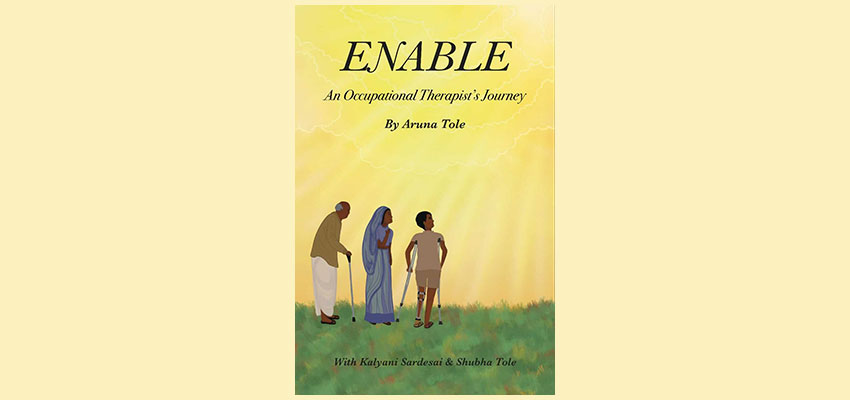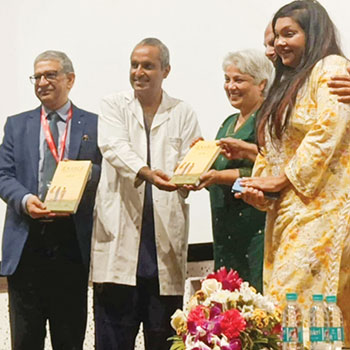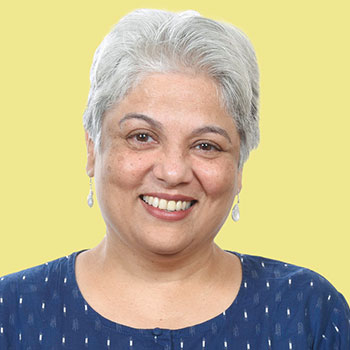Of Inclusion and Innovation

Enable— An Occupational Therapist’s Journey, which was released at the hands of Dr. C Pramesh, Director, Tata Memorial Hospital and Dr. Sudeep Gupta, Director, Tata Memorial Centre, is a book with a message for corporate India and young entrepreneurs—it is entirely possible to build a sustainable business with social responsibility.
Essentially a paramedic’s memoir cum guidebook for budding professionals, Enable demonstrates by example how important it is to make low-cost prostheses, orthoses and appliances for patients who have lost their limbs and bodily functions, due to disease or disability. Originally written by the award-winning occupational therapist Aruna P. Tole, also the former Head of the Department of Occupational Therapy at Tata Memorial Hospital, the book has been redrafted by her daughter the celebrated neuroscientist
-Dr. Shubha Tole,
journalist-writer Kalyani Sardesai for a contemporary audience
The late Aruna Tole started her career in the sixties and seventies at Mumbai’s Indian Cancer Society followed by the Tata Memorial Hospital. A qualified occupational therapist(OT) trained by none other than the pioneer of the discipline of occupational therapy in India-Kamla Nimbkar—she was only among the second batch of OTs to actually make inroads into Indian hospitals.
To explain in brief, occupational therapy is a branch of paramedicine and health care that helps people of all ages who have physical, sensory, or cognitive problems due to a disease or disability. To do this, they use everyday activities, exercises, and other therapies.

But the challenges before Aruna were many. For one, cancer in the sixties pretty much spelt doom and disaster. Public ignorance was high, and knowledge levels of medical rehab low. Considering this was early days yet for OT, there was a lot for a young professional like Aruna to do: from providing counselling and emotional support to dealing with post-surgical functional issues faced by mastectomy patients and amputees in performing activities of daily living.
What’s more, the odds and ends required to make artificial limbs, prostheses (artificial appliances to substitute the missing body part), orthoses (appliance to support the body part for purpose of stabilisation, support, or movement) were not easily available. After all, this was a newly independent, pre-liberalisation India—a world apart for generations used to internet connectivity and the all-encompassing embrace of Amazon.
If a breast cancer survivor needed an artificial breast prosthesis, she would have to import one, at a prohibitive cost. And for sufferers of head and neck cancer with their voice box out, there was no way of buying a voice prosthesis given the issue of both cost and accessibility.
“My late mother had a simple motto: don’t let your job description limit what you do,”said Shubha Tole.“To that end, she used her knowledge of anatomy, Indian lifestyle and inherent understanding of art and engineering to design low cost prostheses that were easily made and easily used. While she documented her work and case studies diligently, she wasn’t able to bring out the book in her lifetime. So, I reached out to Kalyani Sardesai, and we redrafted and simplified the book with the purpose of inspiring young people to take up this noble and rewarding profession, and in the process, inspiring entrepreneurs to come up with affordable products and solutions. With the Indian government committed to inclusion and diversity, there is scope for medical rehabilitation to be easily accessible and affordable.”
Review

Where there is a will there is a way: The book simplifies medical terms and rehabilitation exercises to not just showcase Aruna Tole’s life and work, but also demonstrates how a driven professional can overcome odds to come up with workable solutions. This was particularly important, because the Tata Memorial Hospital, without doubt, one of the nation’s premier hubs of cancer hospital, had patients from poor backgrounds. Determined to help her patients, Aruna found a creative and ingenuous solution to every problem and forged a new path, keeping cost and Indian lifestyle as the bedrock of each of her designs. “A knee and ankle joint must flex completely, or the person cannot squat to perform pooja, play the table, sit down to eat or even use an Indian-style toilet,” she would say, and then go ahead and fabricate one. So be it her hip joint disarticulation prosthesis or a flexible joint or latex leg, each prosthesis was designed for both hand and leg amputees with individual dimensions in mind, and were a step ahead of the existing designs available at the time.
“Considering how poor some of her patients, including fruit sellers, tailors and home-makers were, she created unilateral kitchen aids that could be used by those with only one hand, a sewing machine for the blind with a right-angled presser foot to protect a blind person’s finger from the sewing machine’s needle, and even a coconut slicer that could be operated on foot, for a coconut vendor whose hand had been amputated. These innovations ensured the patients could earn their livelihood post the surgery and rehab. In case of laryngectomy patients whose voice box had been removed, she taught them oesophageal speech,” said Kalyani Sardesai. “What this meant was that she essentially taught them to swallow small amounts of air and burp it back up and use this sound to frame words with the lips and tongue,” added Kalyani.
Her passion brought into her orbit engineers, carpenters, lathe workers, tailors, latex manufacturers, vendors and family and friends to help her achieve her goal: to provide custom-fabricated prostheses, former chairman of the Indian Space Resource Organisation: “People like Aruna Tole need to be honoured by every segment of society because the relevance of their work is much broader than the conventional professionals. Her boundless energy, creativity and compassion made all the difference in bringing much needed life and succor to patients when they needed help, a valuable contribution to humanity. My late wife was one of those touched by her grace and dedication.”
'Enable' will soon be made available on Amazon. Many of the books will be donated to libraries across the country.
MESSAGE TO ENTREPRENEURS AND CORPORATE INDIA
“Enable is not just for budding paramedics but also for corporate professionals because it contains the thought—demonstrated by my mother’s life and work over four decades, that it is possible to wed profit to public interest and a sustainable business with social responsibility. Given the increasing instances of cancer, industrial accidents, lifestyle diseases etc., there is scope to create, customise and scale up prostheses and orthoses such that they are low cost and accessible to all sections of society,” said Dr. Shubha Tole, neuroscientist, professor, and principal investigator at Tata Institute of Fundamental Sciences. Her research investigates the development and evolution of the mammalian brain. Notably, she is also the winner of the Shantiswaroop Bhatnagar award as well as the Infosys award for Life Sciences.